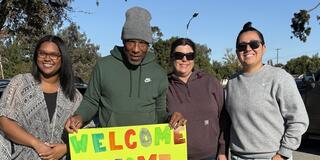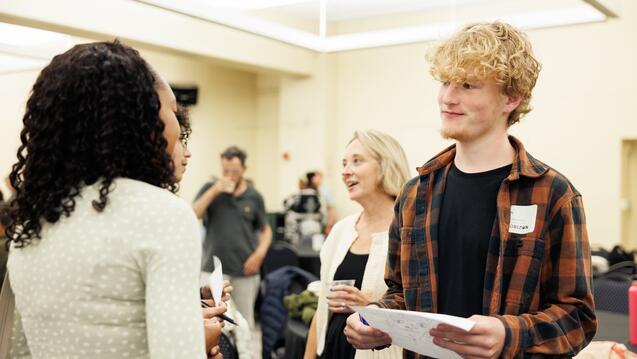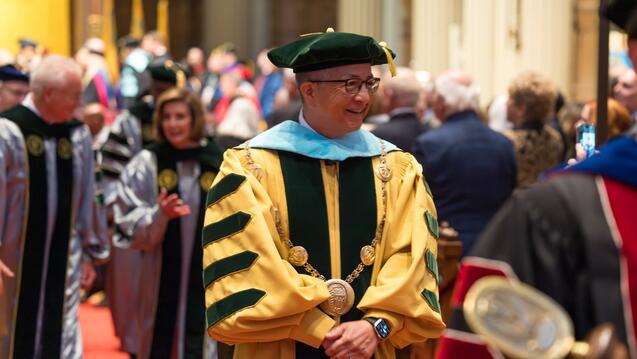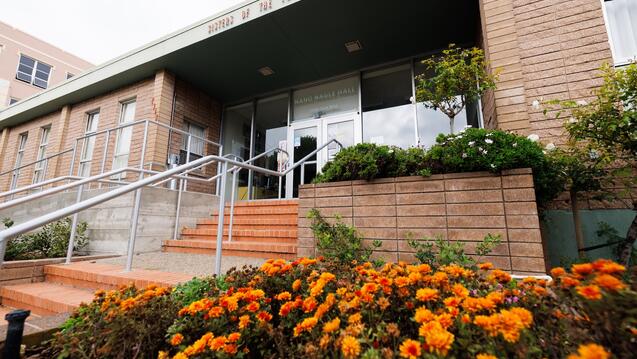Man Freed With Help of Law Student and Professor

Freddie Brinkley, who spent 43 years in prison for a crime he insists he didn’t commit, was freed last week as a result of the efforts of Gabby King ’16, assistant professor and supervising attorney of USF Law’s Racial Justice Clinic, and USF law student Destiny Breda JD ’26.
Brinkley’s release from Soledad State Prison in central California was approved after a favorable ruling at a parole hearing last July. It was his fifth attempt at parole, and the hearing was secured by King and Breda, who worked on his behalf.
At 19, Brinkley was convicted of eight charges for a crime spree in October 1982 that included robbery, kidnapping, and vehicle theft. Now 62, he has always maintained his innocence.
“From our viewpoint, after considering all the evidence and reading through all the testimony, he was in the wrong place at the wrong time,” King said.
The police were looking for two suspects, a man and a woman in their early 20s, both Black, in the section of Sacramento where Brinkley was on the night of his arrest. He happened to strike up a conversation with a stranger — a Black woman in her early 20s — outside a local convenience store. Police spotted them sitting on the curb and arrested both, despite having no evidence linking them to the crimes.
Both Brinkley and the woman, Irene Foster, later testified that they had never met before that night. But their testimonies, the lack of forensic evidence, and Brinkley’s lack of a criminal record weren’t enough to prevent two convictions. After he was imprisoned, another similar robbery occurred, yet Brinkley’s case was not reopened.
But Brinkley never wavered. “He continued to deny he did it, and they kept denying parole,” Breda said. “He first went before the board in 2010, and in four appearances it was never granted.”
Despite Brinkley’s past parole defeats, once King and Breda accepted the case, they quickly determined that it was still his best option for release. “We didn’t think we’d be successful on a wrongful conviction attempt,” said King, in part because it had been so long and so many people who’d been connected with the case — including a man who’d admitted to committing the spree of crimes back in October of 1982 — had passed away. “So we went for a petition to advance.”
A petition to advance asks the parole board to move up an inmate’s next parole hearing. King’s and Breda’s petition to advance was granted in January 2025, and Brinkley’s next hearing was scheduled for July 31 instead of sometime in 2027. The hearing, which normally takes an hour, was three hours long and King was there in person.
“I was happy to be there for him. It was his first in-person experience with any of his attorneys,” King said. For the first time, Brinkley admitted to the parole board, “I understand why they thought it could have been me. I was around the wrong people at the wrong time.”
His acknowledgment that his life choices could have contributed to his arrest wasn’t the only consideration that bolstered his case for release. In June 2025, he came face to face with the man who had murdered his only child, daughter Cheryl Ann Brinkley-Williams, in 2005. He left the prison yard — and the man — in peace.
When Brinkley was asked during his parole hearing how he had been able to react to that situation without resorting to violence, Brinkley said, “Twenty years ago or even five years ago, I would not have been able to have a conversation with him and forgive him. But I’m gonna be faced with a lot of stuff every day. And any reaction I would have had five years ago is not justified. Nobody had to stop me from anything. I stopped myself.”
King said, “I think the fact that this was his reaction, when no one was ‘watching,’ was what convinced the parole board. From Freddie, I’ve learned patience and resilience. He could’ve been out 20 years ago if he had falsely confessed. But he stayed true to himself, and he is so positive.”
King and Breda brought Brinkley a USF beanie, which he donned immediately upon leaving Soledad. They drove him to his hometown of Sacramento, where he’ll live for the next year in transitional housing as he adjusts to his new life with the help of relatives.
Of their trip north, King said, “We went shopping for clothes, food, toiletries, and most importantly, a phone! Leaving the store, Mr. Brinkley took in the most perfect sunset, his first one in over 42 years. Even the sun was happy for him. We spent hours together in the car and our cheeks hurt from laughing. Mr. Brinkley had a smile the entire time and he kept saying, ’This is the best day ever.’"
The students and professors of the Racial Justice Clinic have worked to get three inmates exonerated since 2021. In March 2021, Yutico Briley was freed after his conviction for armed robbery was overturned. He served eight years of a 60-year sentence.
In April 2022, the Racial Justice Clinic team helped free Joaquin Ciria 30 years after he was convicted of a murder he did not commit. And in 2023, Leon Benson’s first-degree murder conviction was thrown out after the USF Law team revealed that evidence buried in the police file by the lead detective pointed to another man as the murderer.


